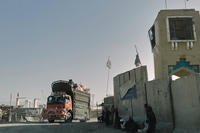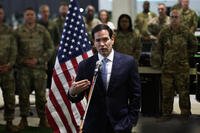Defense Secretary Jim Mattis called on the Senate on Wednesday to look past the murder of Jamal Khashoggi and airstrikes against civilian targets in considering whether to adopt a resolution withdrawing U.S. support for Saudi Arabia in Yemen's civil war.
In remarks prepared for a closed-door session with senators, Mattis argued that acting to punish Saudi Arabia now could derail the latest effort to convene peace talks on Yemen that could begin as early as next week.
Mattis, who was joined by Secretary of State Mike Pompeo at the private session, said in remarks released by the Defense Department that overall U.S. national security interests must take precedence over Saudi culpability for the murder of Khashoggi, a Washington Post contributor who disappeared after visiting the Saudi consulate in Istanbul last month.
"Our security interests cannot be dismissed, even as we seek accountability for what President Trump described as the 'unacceptable and horrible crime' of Jamal Khashoggi's murder," he said.
"We must maintain our twin requirements of holding those responsible for the murder to account, while recognizing the reality of Saudi Arabia as a necessary strategic partner" on a range of issues vital to Mideast stability and Israel's security, Mattis said.
He also told the senators that the U.S. is continuing to work with the Saudis on avoiding airstrikes that could hit civilians in Yemen.
Until recently, the U.S. was providing air refueling for Saudi warplanes, but the American military has continued to provide intelligence to the Saudis in Yemen's civil war, which pits the ousted Yemeni government, backed by the Saudis and the United Arab Emirates (UAE), against the Iranian-backed Houthi rebels.
"I must note we are seldom free to work with unblemished partners," Mattis said. "Long-standing relationships guide but do not blind us. Saudi Arabia, due to geography and the Iranian threat, is fundamental to maintaining regional and Israeli security, and to our interest in Mideast stability."
Last week, Mattis told Pentagon reporters he is confident that peace talks could begin in Sweden in early December under the auspices of United Nations Special Envoy Martin Griffiths that would bring together the Saudis, the UAE, the Houthi rebels and the Yemeni government.
"Senators, I know all too well the difficulty in reconciling human aspirations with war's grim reality. But I also recognize that we cannot limit civilian casualties or advance the peace effort commencing early next month in Sweden by disengaging" with the Saudis, he said in his prepared remarks.
"Pulling back our limited U.S. military support, our weapons sales to our partners, and our protection of the Saudi and Emirati populations would be misguided on the eve of the promising initial negotiations," Mattis said.
In his remarks, Pompeo backed up Mattis, warning that moving against Saudi Arabia would "do immense damage to U.S. national security interests and those of our Middle Eastern allies and partners."
"I know the conflict in Yemen is ugly. We are engaged in diplomacy all around the world to make it less so and have actually made it less ugly. But it's important to remain involved. Talks are scheduled to happen soon," he said.
The Senate vote on the resolution, which could come later Wednesday, is not likely to be binding on President Donald Trump but would amount to a rebuke of his policies.
The resolution would require Trump to withdraw any troops in "or affecting" Yemen within 30 days unless they are involved in actions against al-Qaida.
Several senators complained about the absence of CIA Director Gina Haspel from the closed-door session.
Last week, the CIA issued an assessment concluding with "high confidence" that Saudi Crown Prince Mohammed Bin Salman was involved in the plot to against Khashoggi.
In a joint letter to Senate leaders Tuesday, Sens. Lindsey Graham, R-South Carolina, and Bob Menendez, D-New Jersey, said it was "critical" that Haspel or another CIA official be present for the private session.
"The butchering of a journalist in a consulate on foreign soil, directed by a strategic partner, should be a red line that cannot be crossed without severe consequences for all involved," Graham and Menendez wrote.
-- Richard Sisk can be reached at Richard.Sisk@Military.com.












